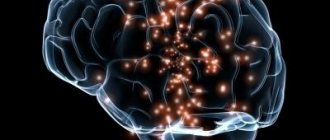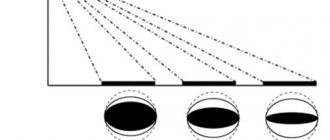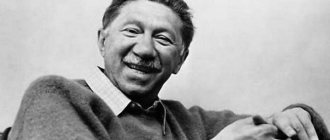Psychology is the main science that allows us to recognize the human soul and character. And also how and why relationships between people develop. Of course, many sciences study the characteristics of human behavior in one way or another. However, it is psychology and philosophy, as interconnected elements, that answer the fundamental questions of existence. But what is psychology? What is psychology as a science? Is it possible to study it independently, without receiving a special higher education? Let's answer these and many other questions in this article.
Psychology studies the most important areas of human life and existence
What is psychology as a science
Today there are many interpretations of the concept of “psychology”. Therefore, in order to better understand the nuances of this science, it is necessary to consider the basic definitions and interpretations of this term.
Psychology is the science of the psyche and various psychological and mental phenomena (for example, love, friendship, etc.), as well as the characteristics of the manifestation and development of these phenomena.
Psychology is a scientific discipline that determines the characteristics of human mental reactions and psychological phenomena in society.
Psychology is the study of the inner world of man and its characteristics.
The last definition, of course, has a simpler understanding. Indeed, in simple words, psychology studies the inner world of a person, his mental health, soul.
As already mentioned, psychology is closely related to philosophy. Therefore, many psychological theories and axioms were developed by famous philosophers. For the same reason, there are many concepts of psychology that have been developed by scientists in the field of philosophical teachings. The study of these scientific positions will allow us to delve into the study of this discipline in more detail. Here are some of the scientists and their definitions:
- Wilhelm Wund. This scientist said that psychology is the science of human consciousness;
- Sigmund Freud. Surely you have heard the name of this thinker more than once. He developed many fundamental psychological and philosophical theories. According to Freud, psychology is the science of the conscious and unconscious. It is worth noting that it was Freud who became the first researcher who divided the psyche of any person into the conscious and unconscious;
- Watson defined psychology as the science of behavior.
As can be seen from the above definitions, some researchers perceive the science of psychology much narrower than it actually is. In fact, psychology is a broad scientific discipline that includes all of the listed factors and features.
“Psychology” from the ancient Greek “psychey” (soul) and “logos” (science) is the science of the soul.
Features of the discipline
The peculiarity of the discipline is that it is full of branches and subsections. Therefore, it is important to study the material as if layering applied knowledge with theoretical knowledge. That is why education in special psychological universities allows you to gain fundamental knowledge. Because the material is presented in the correct order. The chronology is not violated. At the same time, a person receives the most important knowledge.
You will develop critical thinking
Much of the material, theories, approaches, and fields that make up psychological research help us develop critical thinking . Whether we like it or not, this is very important if we want to be good professionals and truly want to be useful to people without losing our integrity. Only then will we be able to distinguish wood from trees and clarity from deception.
Never think you know everything. No matter how highly you value yourself, always have the courage to say to yourself: I don’t know.
Ivan Pavlov
What does psychology study?
The center of study of any science is its subject. But it is classically customary to distinguish three main blocks of studying psychological science. Simply put, these are certain branches of knowledge that are the subject of study of the science in question. Let's take a closer look at them:
Fundamental psychology
Studies the human personality itself. That is, it reveals the basic and basic laws of the human psyche - character, its elements, feelings, emotions, as well as basic psychological laws and theories.
Applied psychology
The applied industry, in turn, is placed in environmental conditions. What does it mean? This means that this field studies the features of fundamental psychology in naturalistic settings. For example, features of personality development in certain conditions.
Practical psychology
Practical is devoted to the application of acquired fundamental and applied knowledge in practice. In simple words, this is the same analysis of a specific personality. For example, you are trying to determine what type of personality your friend has. Or is it simply the work of a psychologist.
Thus, generalizing the above, psychological science studies social and personal phenomena, such as:
- Basic basic concepts;
- Inner world and personality consciousness;
- Unconscious processes of personality and consciousness;
- Features of behavior;
- Relationships between people and their characteristics;
- Psychosomatics;
- Mental disorders and illnesses;
- Peculiarities of influence on the human psyche.
Psychology is a science that allows you to understand yourself and others
Psychology helps us understand ourselves better
As we delve into other theories, different approaches to personality, human development, or how culture influences our behavior, we are forced to look at our lives and the lives of others.
Studying psychology will force us to ask ourselves many questions. Questions that don't always have an answer. It will be an adventure where we get to know ourselves and other people a little more, where we can leave behind certain views and ideas that used to be so important to us.
Problems of psychology
So, we have figured out what is studied by psychological science. But what is this for? What are her tasks? Psychology textbooks highlight many problems. Here are some of the main ones:
- Study and analysis of the fundamentals of psychology, personality patterns, as well as its development;
- Study of psychic phenomena;
- Analysis of how these phenomena form and develop;
- Study of the mechanisms of various mental phenomena;
- Finding ways to influence mental phenomena occurring in a person’s personality;
- Formation of professional psychologists, as well as dissemination of valid knowledge about the science of psychology.
This is precisely the main task of this science. Studying psychology allows you not only to understand how social connections and relationships between people are built, but also allows you to better and deeper understand yourself.
Each person pursues his own goals when studying psychology
Literature
Literature should be selected based on the topic of interest. If you are going to study the characteristics of children's behavior in order to better communicate with your own child, then you are unlikely to need a textbook on pathopsychology. What will definitely come in handy is a book on the basics of general psychology and a dictionary of psychological terms. These books will make all other information accessible and understandable.
You can choose the author at your discretion. At the moment there are many of them and there is a great chance to choose the one whose presentation style is closest to you. The only thing worth paying attention to is the author’s biography, the presence of practical experience, scientific works, well-deserved degree, etc.
Freud, who is considered a classic and inextricably associated with psychological science, is not for everyone. The writing style and terminology may be difficult for beginners to understand and requires knowledge of the concept of psychoanalysis. In addition, many of his theories have already been criticized and are not relevant at the moment.
Subject and object of psychology
These concepts are studied in the process of obtaining professional education. And also when receiving medical education (a psychologist is not always a doctor, but a psychotherapist and psychiatrist have the status of doctors who can prescribe medication treatments for clients).
Item
The subject of psychology is the study of how various mental phenomena are formed, develop and cease
An object
The object is much wider than the subject. The object is the psyche as a whole and everything connected with it. The object includes elements of the subject
The objects of psychology as a science include the following elements and processes:
- Mental processes (feelings and emotions, relationships, connections, love, friendship, manipulation, abusive and codependent relationships, etc.);
- Conditions (also feelings and emotions, anxiety, nervousness, paranoia, perfectionism, empathy, melancholy, depression, bipolar disorder, nostalgia, schizophrenia, hedonism, conformism, frustration, sublimation, time pressure, misanthropy, etc.);
- Properties (these include a person’s character, including egocentrism, psychotype, personality types, introversion and extraversion, cynicism, altruism, etc.);
- Education (knowledge and skills, as well as habits of a particular person. For example, reflection, addictions, etc.)
We all want to be happy, but too much happiness has a negative impact on work
Based on a survey of more than 10 thousand people in 48 countries, it was found that happiness is valued more than other personal prospects - finding the meaning of life, becoming rich or going to heaven. Happy people more often call themselves curious, while depressed people are able to notice even minor changes in the facial expressions of their interlocutor. And also very happy people (9 out of 10 or 10 out of 10 points on the scale of measuring happiness - there is one) did not study well and receive a small salary, compared to moderately happy people (6, 7, 8 out of 10 on the scale).
Psychology Research Methods
To correctly study the subject and object of psychological science, various methods are used. A method is a way of cognition, a certain set of mechanisms of cognition. As in any other science, general methods, special and specific, are used. In this section we will look at more specific and psychology-specific ways of knowing. These are the methods that are most applicable and effective in practice.
Observation
Observation allows us to recognize external factors of human behavior and its characteristics. When communicating with a client, psychologists pay attention not only to what he says, but also to how he behaves.
Body language and reactions allow us to draw conclusions about a person’s state, whether he is tense, afraid, and how important this or that issue is for him.
Self-observation
Self-observation is most often carried out through diaries and notes. For example, a person might keep an emotional diary. This allows you to analyze your emotional state, identify irritating factors and subsequently eliminate them from your life.
Self-observation allows you to say much more about yourself
Psychological tests
Psychological tests also reveal more about a person's personality. Of course, you can take tests online. There are a lot of them. Such tests are also available on our website.
However, for a complete clinical picture, their analysis from a professional is necessary. A psychologist will help you choose the right test option, assessment system, and also leave a clinical picture.
Conversations
Conversations are a way to find out more about someone. That is why meetings with a psychologist, psychotherapist and psychiatrist take place in the form of a dialogue. You can ask leading questions, clarify what will help you learn more about the situation and the person’s condition.
Suggestion
This method can be considered both negative and positive. Sometimes such a suggestion from the outside is enough to make a person feel insignificant. Suggestion at its core is the obsessive repetition of the same idea. Therefore, it is possible that in order to get out of a state of self-dislike, suggestion from the outside or self-hypnosis is also necessary.
Other methods
Today other methods can be used. Someone is trying to combine psychology and astrology. You can meet psychologists who use occult objects for their sessions (tarot, runes, etc.). Some people use hypnosis.
There is nothing wrong with expanding the possible methods. The most important thing is that they do not harm clients and patients.
Every psychologist looks for his own way to work with clients.
Power makes us obedient and can force us to do things we could never imagine.
In Milgram's famous experiment, participants were asked to give shocks of increasing intensity if a subject in the next room gave incorrect answers to questions asked. The role of the victim was played by the experimenter's assistant. The participant initially delivered weak shocks, but in the second part of the experiment he was asked to press the "Danger: High Current" button, ignoring the victim's requests to stop the experiment. As a result, 63% of the subjects pressed the button with the maximum discharge, which, if it had not been staged, could have been fatal to another person.
A brief history of the development of psychology as a science
Psychology was formed over a long period of time. In fact, its occurrence is associated with the emergence of man and his socialization. Therefore, in the most ancient times, people studied the mental processes of the individual.
| Period | Content | Peculiarities |
| Stage 1 (more than two thousand years ago) | At this stage, psychology was considered as a study of the human soul | Since this period is not characterized by the presence of a large number of branches of human knowledge. Many phenomena did not have a reasonable explanation. Therefore, the study of the human soul has become a way to explain incomprehensible phenomena |
| Stage 2 (17th-20th century) | Psychology began to be viewed as the science of human consciousness | During this period, scientists and researchers suggested that feelings and emotions are elements of consciousness. During this period, the main source of knowledge was the method of observing behavior, character and emotions |
| Stage 3 (20th century) | Psychology is the science of human behavior (both independently and in interaction) | During this period, knowledge about psychology became deeper. Various features of behavioral reactions were observed. They began to connect with the personality itself and its characteristics. Therefore, there has been a connection between an individual and how he interacts with others |
| Stage 4 (present) | Psychology is a complex science that studies facts, patterns and phenomena of the human psyche | A feature of this time period is a comprehensive understanding of the various elements of the psyche and their relationships |
Brief table of periods of development of science
The first of these periods is characterized by such famous names as Aristotle, Plato, Democritus. They were the first people who tried to find the answer to the question “what is the human soul?” Aristotle's work “On the Soul” is considered the first psychological work in our world.
The second period, in turn, confirms the relationship between psychology and philosophy. Various philosophical attitudes move into the sphere of knowledge of psychology. Famous personalities of that period - Descartes, Locke, Spinoza.
At the junction of the second and third periods, the so-called crisis of psychology as a science occurs. This is due to the fact that people studying the human psyche lacked practice and practical knowledge. Therefore, for the most part, the study of mental phenomena of personality has entered a state of stagnation.
In the 20th century, a transformation of views began. There was more practice and the study of practical cases. Therefore, a new stage in the formation of science has arrived.
Today psychology is one of the most popular fields. Not only are psychological universities very popular among people. But people also try to independently understand this area of knowledge.
Psychology as a science has a long history of formation
Improving problem solving skills
Knowledge of psychology will also help you solve everyday problems more effectively. When you have an understanding of how people might react in a certain situation, you can put a better spin on the situation. Moreover, understanding your own thinking and psychology will help you cope with problems without losing your composure. You will analyze the situation and cope with it more successfully than if you did not have knowledge in the field of psychology.
FAQ
In this section, we will try to answer the most common questions that arise among people who have begun to take an active interest in the peculiarities of the human psyche.
How are philosophy and psychology related?
As already mentioned, psychology and philosophy are interrelated sciences. Since many ideas and patterns are blackened by philosophy. Moreover, learned philosophers have made just as significant contributions to the development of psychology as learned psychologists.
These two sciences have the same methods and similar subjects. Psychology is an opportunity to answer the fundamental philosophical questions “What is the soul?”, “What is the meaning of life”, “How to live correctly”, “What is love” and others like that.
What can you become after receiving professional education as a psychologist?
This area of knowledge is very universal. It can be used everywhere, including for personal purposes.
When you receive education as a psychologist, or as a psychiatrist and psychotherapist, you can work in your specialty. In addition to the monetary component, you also have the goal of helping people who need it.
With a psychological education, you can become a consultant, coach, or teacher. Personal consultants in companies are now in great demand, so it is not necessary to engage in psychological practice.
But even in a situation where you do not want to connect your life with psychology in any way, getting an education has significant benefits. You can recognize an abuser in the early stages, see the tyrant behind the mask of virtue. Moreover, you can more correctly choose the necessary way out of conflict and communication. This knowledge will allow you to build a healthy and ecological relationship with a loving person.
Can psychologists have psychological and mental problems?
A psychologist and a person who studies psychology is a person like everyone else. Therefore, it is normal if at some point he has psychological problems (trauma, stress, depression). The only difference is that the psychologist can notice the symptoms of some diseases and disorders in himself. But his illnesses also need to be treated.
Is knowledge of psychology always enough for self-medication?
Of course not. If we are talking about easy problems - worries, obsessive thoughts, then Nana's psychology will be enough. However, there are also mental illnesses, as well as serious injuries. Their diagnosis and treatment is only possible from the outside. Therefore, it is necessary to contact a specialist, even if you yourself have a professional education in this industry.
There are many questions regarding the study of psychology
Observation from the outside helps sometimes, but not while eating.
If you are observed while performing a simple task, your results will increase, but if you are observed during a complex task or a task related to learning a new skill, your results will decrease. By the way, this feature is inherent not only to people, but also to cockroaches (!). Being in a room with others has another effect: if a repairman is working in the room (even in the very corner), people begin to work more slowly. In addition, people, like animals, eat more if they eat in the presence of someone else.
Should you consult a psychologist if you have problems?
Of course it's worth it. What is more important here is the ability to contact a specialist in case of problems. You can contact a psychologist if you have problems of varying importance. Consultation is necessary for mental illnesses (for example, depression, bipolar mental disorder), as well as serious and profound injuries.
For example, victims of domestic violence need specialist advice. Since it is impossible to work through this moment on your own. For many factors. For example, due to the presence of Stockholm syndrome, when the victim idealizes the rapist and begins to justify him. Therefore, a professional view and approach from the outside is needed.
For every passion there is a specialty
Not all psychologists are psychoanalysts or follow Freud's principles; in fact, many more do not. Studying psychology gives us the opportunity to subsequently study in a wide range of specialties so that we can choose the one we like best. There are many options:
- Clinical psychology.
- Educational psychology.
- Sports psychology.
- Criminal psychology.
- Psychology of health.
- Organizational psychology.
- Child and adolescent psychology.
- Social or community psychology.
Is it possible to learn psychology on your own?
In the modern world, when there is the Internet and the opportunity to get all the resources for learning, this is possible. You can take courses in psychology (they are not equivalent to professional education), buy and read specialized literature, watch video lessons, or go to our website. Therefore, knowledge is quite accessible.
The main thing is to have time and desire. And also the purpose of your training.
It is important to understand that such self-education cannot be equated with education at a university. What does it mean? You will not be able to provide services to people on a monetary and professional basis.
Self-control at an early age may indicate success in adulthood
Another famous experiment is the “marmalade test”. The child is left in the room, and marmalade or cookies are placed on the table in front of him. And they warn: he can eat marmalade (or cookies) now, and then the experiment is considered over. But, if he waits for the experimenter to return, he will receive two gummies as a reward.
Children who can't wait and eat jelly right away or try to eat it on the sly are more likely to have problems in the future at work, get low grades when applying to university, have problems paying attention in school and have difficulty maintaining friendships. It's a fact: a child who can wait 15 minutes will score half as much on admission as a child who only waits 30 seconds.
Why study psychology
There can be a lot of goals. Let's look at some of them:
- Know yourself better;
- Help other people;
- Build healthy and environmentally friendly relationships with other people;
- Get out of conflicts correctly;
- Adequately analyze the people around you;
- Save a person (friend, buddy, relative) from problems. For example, help get out of abusive relationships, help with addictions, and also convince you of the need to see a specialist;
- Work professionally and earn money (independent familiarization with the science of psychology can only be the first step to obtaining a higher education);
- Experience your own stress and traumatic events correctly;
- Personal growth.
In general, there are many goals for studying psychology. They can compile with each other. And also supplemented by personal motivation. For example, a person grew up in a family in which the mother used physical and psychological violence against the child. To prevent the vicious circle of violence and unhealthy psyche, the child begins to be interested in psychology. Tries to work through the problem so as not to repeat the same behavior in his own family.
Studying psychology provides many benefits to an individual.
Study of psychology: forms of training
The choice of the form of training plays no less important role in the study of psychology than everything else. But it depends on what goal you initially set for yourself. If your task is a full-fledged study of child psychology, real practice, work as a psychologist in a government or commercial institution, the best choice will certainly be a university where you can master the corresponding specialty. The training there is carried out by professional teachers, students are provided with a wide variety of practical training, knowledge is given in a clear, systematized form, proven over decades.
If the goal is simply to learn to better understand people, understand the characteristics of the human personality, master the skill of self-help and helping loved ones in difficult life situations, or simply self-development and increasing the level of one’s education and intelligence, independent studies are quite suitable.
Today, trainings and seminars on teaching psychology for non-specialists are constantly held, courses and other educational events are organized. In bookstores and the Internet you can find many worthy tutorials, study guides, programs and other materials from which anyone can learn the basics of psychology and take for themselves what they need.
We would like to pay special attention to our own free course “Human Psychology”. It is devoted to the main branches of psychological science, such as general psychology, methods of psychology, personality psychology, motivation, developmental psychology and social psychology. You can also learn from it about the best books and textbooks, many psychological effects, interesting experiments and games. And after completing the course, you will have to pass two exams: one in theory, the second in practice.
Thus, anyone can study psychology on their own. The only thing you need to understand is that you won’t be able to master this truly amazing science in a couple of days, weeks or months. Firstly, this will not be possible due to the enormous amount of information that needs to be read, studied and understood. Secondly, the acquired knowledge will definitely have to be applied in practice, which also requires a lot of time. And thirdly, the field of psychological science itself is constantly developing, becoming wider and more multifaceted, which means that you need to constantly update your knowledge base, study new trends and keep up with the times.
If you are determined to start studying psychology, it is possible that you will devote your whole life to it. But this is a worthy path, through which you will become better, smarter, more experienced and wiser. So analyze life and people, observe, build cause-and-effect relationships, ask questions and look for answers. Studying psychology is the beginning of a new life, and this life is worth living.
In conclusion, we invite you to learn even more about the benefits of studying psychology for humans. Take a break from reading, relax and take some time to watch a video with the participation of a psychotherapist, candidate of medical sciences, associate professor of the department of Ryazan State Medical University named after. Pavlova Evgeniya Shitova:
We also recommend reading:
- Storytelling
- Robert Cialdini, Noah Goldstein, Steve Martin “The Psychology of Persuasion” - summary
- False and real self-development
- Reverse psychology
- 6 Skills to Develop Emotional Intelligence
- Wundt's method of studying psychology
- Practical psychology
- Cognitive economics: the science of thinking
- Cognitive psychology and cognitive psychotherapy
- Psychology of Advertising
- Criminal psychology
Key words:1Self-knowledge
Where to start studying
We have already looked at what psychology studies. But where should a beginner start? In fact, you can read information randomly on topics of interest if you do not want to study science systematically. For example, you are interested in how to get out of conflict situations. That's why you read the relevant materials. Such study, of course, will not make you a professional.
If you want a more comprehensive approach to learning, then you need to start with the theoretical foundations. Just the same, we need to focus on studying the subject and object of psychology, tasks, branches and sections. And then layer on the theory other material, more applied and practical.
Advice: buy books on psychology. Everything in them is put together in the correct and necessary sequence. Given definitions and theory. For practical knowledge, you can turn to the Internet.
General outlook
Studying psychology for overall development is a good idea. The general horizons need to be constantly expanded. Firstly, this will allow you to improve the quality of your self-education and the depth of your personality. Secondly, you will be able to discuss a wider range of topics. Thirdly, this is a good way of self-knowledge.
Child psychology
Many young parents and expectant mothers are often interested in how to properly raise their child. It is in this situation that the section of child psychology comes to the rescue. The child's psyche is strikingly different from that of an adult.
Special books and manuals can answer many questions:
- How to talk to a child;
- How to build trusting relationships;
- How to overcome a crisis of a certain age (3, 7, 13 years);
- How to explain something to a child;
- How to help him;
- How to love and show love towards children, etc.
Psychology of creativity
Many creative works influence the human psyche, evoking in him feelings of beauty, compassion, empathy, disgust, etc. Therefore, in order for a picture or film to achieve its result, it is necessary to understand how and what elements can influence the human psyche.
If you pay attention to works of the horror genre, you will see special techniques that are used to create an atmosphere of fear and fear. It is also based on the functioning of our brain and subconscious mind. Therefore, studying psychological foundations can be a good basis for creativity.
Another example is designers. They have the concept of “color psychology”. The psyche reacts to certain shades in a specific way. Therefore, when creating logos, projects, websites, banners, designers should be guided by the basics of color psychology.
Psychology is common in design, business
Psychology of success
Motivation and self-confidence are the engines of our success in life. Therefore, now on the shelves of bookstores you can often find literature that is devoted to how to achieve success, profit, and how to build a business.
Studying psychological science allows you to choose the right method for achieving goals and results. You can find many techniques for visualizing your dreams, for working through insecurities, etc. This really allows you to achieve success, since everything comes from our head.
Self-development
Using knowledge of psychology, you can work through your own conflicts and problems:
- Excessive self-esteem;
- Egocentrism;
- Excessive altruism;
- Uncertainty;
- Closedness;
- Work through negative character traits;
- Understand which relationships are pulling you back and get out of them;
- Correctly defend your personal boundaries;
- Protect your interests and desires;
- Self-esteem and respect from others.
A smile is contagious and says a lot about you.
konradbak/Depositphotos.com
In a movie theater, a person will laugh more if the people around him are laughing. Another situation: bowling, a man hit a strike, but only started smiling when he turned to his friends. This is a smile for social approval, and not from the joy of having done something successfully.
One study found that students who showed Duchenne smiles (the most genuine smiles that use the muscles around the eyes and mouth) in album photos were more likely to be married and more likely to describe themselves as happy 30 years later. And students with less pronounced smiles were much more likely to get divorced.
Famous psychologists and their theories
Today, science is actively developing. Therefore, there are many theories now. Let's look at the most popular of them.
| Psychologist | The essence of the theory |
| Sigmund Freud | Developed a theory of the conscious and unconscious. In his opinion, behind every mental pathology there is an interconnection of conscious and unconscious elements of the human psyche. |
| Abraham Maslow | Developed the famous theory of human needs |
| Lev Semenovich Vygotsky | He developed theories of the influence of the team on a person’s personality, the processes of socialization and social development, features of the psychological development of the individual |
| Jean Piaget | Created a theory of cognitive development of personality. Now his works form the basis of many methods of cognitive psychology |
| Eric Ericson | Developed a clear and relevant theory of the stages of psychosocial personality development |
Table of theories of famous psychologists and philosophers
The world of psychology. Main directions
In what directions is modern psychology developing? Where to start studying trends in the development of the main directions of this science? You cannot succeed in everything at once, and you need to decide on the direction in which a person will feel most confident, what is closer to him to learn and apply.
The classic directions are:
- cognitive direction;
- Gestalt psychology;
- associative psychology;
- humanistic;
- deep.
And there are also new directions: psychodrama, coaching, transpersonal psychology and neurolinguistic programming.
What books will help a beginner
What books should I start with to get to know myself and the science of psychology? Initially, let’s say that this can be either non-educational literature or textbooks or monographs on the topic under consideration.
- L. Burbo “5 injuries that prevent you from being yourself.” This book will tell you in an easy and understandable way about the five main personal traumas. He will also tell you what methods and methods can be used to work them out;
- D. Kehoe “The subconscious can do anything.” Reveals such elements as consciousness and subconsciousness, as well as how they work and interact with each other;
- K. Jung “Memories, Reflections, Dreams.” The book is quite popular in Jung's writings. It reveals deep psychology. In general, all of Jung's works are required reading, as they reveal the basis and basis of psychology;
- D. Goleman “Emotional Intelligence.” Reveals the characteristics of our emotions and the emotional functioning of the brain.
If you want to go deeper into more theoretical knowledge, any general psychology textbook will do. It can be purchased, downloaded or borrowed from the library. The choice is yours.
We will learn to appreciate the scientific method
Psychology is not magic. We are not mentalists, and we do not have a radar in our minds that allows us to grasp in 5 seconds what trauma a person is suffering from , what he is afraid of, or what his strengths are.
Psychology, as we know, has many false myths associated with it, and we will have to confront them in many situations, whether we like it or not. However, there is one aspect that we must make clear from the very beginning: psychology is a social science based on the scientific method.
We must understand that in order to come to certain conclusions and certain views, we need to go through a lot of objective and patient work. This work is always based on a series of research methods and is the path to success as a psychology major. On the other hand, “pop psychology”, which the general public loves so much, and which we see every day in magazines or social networks, has nothing to do with reality.
Psychoanalysis
Psychoanalysis has a completely different approach. Here, any action is regarded as the result of interaction between three human entities: I, It and Super-Ego.
Goal It is to achieve satisfaction of needs, to gain pleasure. The super-ego embodies internalized norms, rules established in society, prohibitions. Between these two entities is the Self, which is trying to organize impulses, develop ways to protect the personality, look at the world intelligently and correspond to it.
Human behavior will depend on the strength of instincts, social norms, and a person’s own ability to choose successful actions that meet a specific goal.
In the process of life activity, the ego is not always able to cope, for example, with the influence of unsatisfied primary needs. As a result, it develops special means of defense.
- Regression into child behavior and attitude occurs due to the inability of an adult to cope with his responsibilities. Memories of childhood, where it was safe and good, make you feel sad for those times, try to find a strong person who can provide protection, and obey him.
- Projection and identification are associated with the transfer of thoughts, emotions, and actions to another person. Often such protection arises in young couples when the girl tries to imagine that her boyfriend sees the world exactly the same way as she does. At the same time, projection is associated with the transfer of unacceptable desires and thoughts, and in the process of identification, on the contrary, the other person becomes the owner of the qualities that you like.
- In the process of rationalization, only information that contributes to social approval of behavior is used. The smoker refuses to believe that smoke bothers others. But he is absolutely sure that a smoking break helps establish social contacts.
- Repression is another defense mechanism that influences behavior. Consciousness helpfully promotes forgetting the motives for actions that turn out to be unacceptable.
Another defense mechanism is sublimation. Thanks to him, unspent energy associated with instincts is transferred to creativity. Hence the bright, non-standard behavior, the ability to improve the oppressive atmosphere in the family and team.
The importance of psychology in human life
Already in early childhood, personality formation occurs. Each person absorbs information from the world around him. Under the influence of this knowledge, a person’s character is formed. On the path of life, every individual encounters many problems. Depending on character and desire, a person can cope with difficulties or, conversely, submit to fate.
Self-control is of great importance in all kinds of problematic situations. If an individual knows how to control his emotions, it is difficult to unbalance him. Such a person knows how to behave in society, how to please people, and achieve the desired result.
There are simple rules, following which you can easily achieve success:
- you need to learn to understand people;
- You need to maintain good relationships with everyone around you;
- it is always necessary to respect the interests of other members of society;
- you cannot give up in the face of difficulties;
- you need to fight for your interests in any situation;
- Don’t constantly blame yourself for mistakes and often remember your failures;
- to achieve success, you need to constantly do something;
- You can’t be afraid to take action and take responsibility.
People behave differently when they find themselves in an unfamiliar situation. Some are starting to take active action. More timid and suspicious individuals, on the contrary, may lose heart. Different reactions to the same situation are explained by individual personality characteristics, upbringing, education, and moral training.
A morally unprepared individual does not know how to behave correctly when faced with danger. Instead of acting or running away, he may lose clarity of thought, become completely motionless and vulnerable.
In order for an individual to be able to cope with various troubles that are likely to come his way along the path of life, he needs to prepare for negative situations, strengthen his psyche and will. This task can be accomplished with the help of knowledge from the field of psychology. If a person is psychologically prepared for any trouble, nothing can scare him; he can adequately react to danger and act correctly in any situation.
The science of our psyche
The only thing more exciting than self-examination is the study of scientific experiments and psychological phenomena. The selection includes unique works on logotherapy, secrets of the Stanford prison experiment and notes from a neuroscientist who changed her life by hacking the brain.
Hacking Psychology: All Psychological Theories in One Book
Sandy Mann
The strange girl who fell in love with the brain: How knowledge of neurobiology helps you become more attractive, happier and better
Billy Fitzpatrick
Lucifer effect. Why do good people turn into villains?
Philip Zimbardo
Logotherapy and existential analysis: Articles and lectures
Victor Frankl










